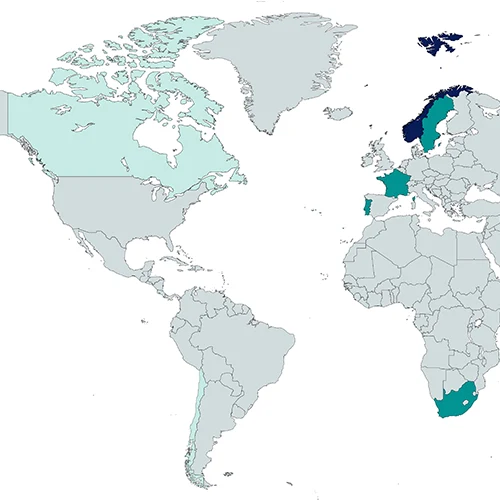2023-04-01 to 2026-03-30
Approx. 1 mil. EUR
-
Sustainable Heritage and Environmental Management, Ecological and Environmental Change Research Group, University of Bergen, Bergen, Norway
-
School of Environment and Sustainability, University of Saskatchewan, Saskatoon, Canada
-
Laboratory of Biogeography and Sustainable Territorial Systems, Pontifical Catholic University of Chile, Valparaíso, Chile
-
MAB France, Castanet Tolosan, France
-
Division of Ecological and Earth Sciences UNESCO, Man and the Biosphere Programme Secretariat UNESCO, Paris, France
-
Centre for Functional Ecology/ Department of Life Sciences Calçada Martim de Freitas, University of Coimbra, Coimbra, Portugal
-
Global Change Institute, University of the Witwatersrand, Johannesburg, Republic of South Africa
-
Faculty of Science, Engineering and Agriculture: Department of Geography and Environmental Sciences, University of Venda, Thohoyandou, Republic of South Africa
-
Stockholm Resilience Centre, Stockholm University, Stockholm, Sweden

The era of the Anthropocene is characterized by multiple interconnected crises which threaten the integrity of the biosphere and humanity’s capacity to meet our basic needs. Diverse and pluralistic approaches to conservation, which go beyond Protected Areas and combine various land-uses and sustainable resource-use, are essential to bending the curve of biodiversity loss, as well as preserving the rich interconnections between nature and human wellbeing. There is an urgent need to understand and monitor effectiveness for biodiversity conservation of these types of approaches, and their contributions to local, regional, and national commitments to reversing biodiversity decline. This will allow us to maximise opportunities available to conservation in the long run whilst ensuring equitable approaches that enhance wellbeing amongst inhabitants and stewards of areas of biodiversity importance.
BECOME will use UNESCO Biosphere Reserves (BRs) as model systems to understand how to manage synergies and trade-offs between conservation objectives and human development through pluralistic and inclusive landscape-scale approaches to conservation. BECOME will combine diverse methodologies from natural and social science to evaluate effectiveness of BR management, harnessing existing data, including long-term governance and biodiversity data, to analyze BR effectiveness across temporal and spatial scales. BECOME will also work with local BR stakeholders and rights holders to capture and develop context-dependent but generalizable metrics which are adapted to BR objectives, facilitate the collaborative adaptive management learning feedback loop, and reflect synergies between conservation and development objectives.
BECOME takes an explicitly inter- and trans- disciplinary approach, where we engage scientists, researchers, stakeholders, and rights holders at various stages of the knowledge co-production process. In addition to producing high quality research, we will implement activities, such as workshops and exchange events, which encourage learning between all partners. During the project we will:
-
Analyze long-term legacy datasets on management effectiveness and land-use change in Biosphere Reserves globally.
-
Document case studies of diverse approaches to Biosphere Reserve management in order to develop participatory monitoring frameworks for tracking effectiveness across different objectives.
-
Use futures visioning methods to generate shared visions and learning opportunities among BR stakeholders/rightsholders, generating new indicators for monitoring future BR changes.
-
Collaborate with partners across Biosphere Reserves and regional, national and intergovernmental authorities to enhance implementation of the post-2020 Convention on Biological Diversity Targets in Biosphere Reserve territories.